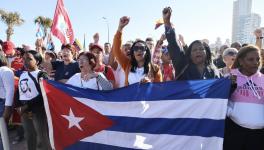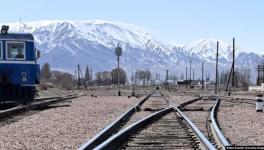Economic Sanctions Make People in Targeted Countries Poorer, Sicker, Vulnerable
Activists in Los Angeles, California hold banner against sanctions ahead of the OAS Summit of the Americas and the counter People's Summit for Democracy. Photo: Midia Ninja
Economic sanctions, often illegally imposed, have a lasting negative impact on the populations in targeted countries and almost never achieve their stated goals, claims a new study published by the Washington-based Center for Economic and Policy Research (CEPR).
Sanctions imposed by individual countries without the approval of the UN Security Council are known as unilateral coercive measures. The study finds that they affect the living conditions of the majority population of the targeted countries by making them poorer and more precarious. This is largely because targeted governments have a reduced capacity to maintain social and economic policies which support the majority of the population, and especially the most vulnerable.
The study titled the ‘Human Consequences of Economic Sanctions’ published by Fransciso Rodriguez, examines the evidence and arguments presented in 32 studies of sanctioned economies, mostly poor and third world countries. It concludes that “it is hard to think of other policy interventions that continue to be pursued amid so much evidence of their adverse and often deadly effects on vulnerable populations,” particularly when they are extremely ineffective in achieving most of their stated goals.
Increasing use of unilateral punitive measures by the West
There are 54 countries from across the world today which are under some kind of economic sanctions. Some of these countries such as Cuba, Iran, North Korea among others have been under sanctions for decades. The study notes that, “over the past six decades, there has been significant growth in the use of economic sanctions by Western powers and international organizations.” It notes that in the 1960s, less than 4% of countries in the world were subjected to sanctions imposed by the US, EU, or UN. Now that figure has risen to 27%.
The report notes that the rise in the number of countries under sanctions also means a rise in the global GDP under sanctions. Only 4% of global GDP was under economic sanctions imposed by the US, EU and the UN in the 1960s, while today it stands at nearly one-third of total global GDP or around 29%.
Individual or entity-specific sanctions have also been on the rise. For example, from Barack Obama administration to Joe Biden’s, the number of such sanctioned entities rose from 544 to over 1,100.
Only a small number of countries and entities are legally sanctioned by the UN Security Council. The majority of the entities and countries are subject to illegal sanctions imposed by individual countries such as the US or groups like the EU.
Impact of sanctions
The study focuses on the impact of economic sanctions on per capita income, poverty, inequality, international trade, child mortality, undernourishment, life expectancy, and human rights.
The different studies referenced in the report have established that in all the countries which were targeted by sanctions legal or otherwise, the economies declined or did not grow as they would have in the absence of those sanctions which restricted economic trade and investments. The impact was visible in decline or stagnation in per capita income, rise in poverty or slower increase in poverty eradication, rising inequality, contraction in international trade, increase in child mortality and undernourishment, lower life expectancy, and contraction in human rights.
Sanctions limit the government’s access to foreign exchange and lower capabilities to generate revenue due to contraction or slow economic growth. This limits their ability to deliver basic goods and services to the people, particularly at a time when they need it the most.
Case studies of Iran, Afghanistan, and Venezuela
The study focuses on three examples out of the 30 case studies quoted—Iran, Afghanistan, and Venezuela—to illustrate the impact of sanctions on a country’s economy and the basic human rights and living conditions of their populations.
Iran has been under US sanctions since 1979. The UN also imposed sanctions on Iran over its nuclear program from 2006, which ended in 2015 following the signing of the Joint Comprehensive Plan of Action (JCPOA). The US sanctions which were relaxed between 2015 and 2018 were reimposed when the Donald Trump administration decided to unilaterally withdraw from the JCPOA.
The study notes that “Iran’s GDP, oil production, and export data time series clearly display marked declines following each round of sanctions.” It further notes that “studies using household survey data find that rural households, belonging to low-and middle-income groups, or those headed by old and unemployed persons, had the highest likelihood of moving into poverty in the sanctions period.”
It notes that sanctions impacted the health sector in Iran as well, causing shortages of 73 medicines, out of which at least 32 were declared as essential by the WHO.
Similarly, Afghanistan—which came under formal UN sanctions in 1999—has seen a massive decline in its national and per capita income, mostly due to the war since the 1980s.
Despite knowing the precarious economic condition of Afghanistan, the US and the EU have confiscated USD 9.6 billion of Afghan assets following Taliban’s return to power in 2021. This amount is almost half of Afghanistan’s present GDP. Sanctions have also severely affected the inflow of remittances to the country, which stood at around US$ 800 million annually before the Taliban came to power.
The US has imposed numerous sanctions on Venezuela since 2017, which have led to a fall in the country’s overall imports by 91% by 2020. The most significant impact was on the import of food, which declined by 78%. The study notes that for a country which is almost totally dependent on imports to fulfill its food needs, sanctions have led to massive food insecurity.
The study notes that “Venezuela’s deep deterioration in indicators of health, nutrition, and food security occurred alongside the largest economic collapse, outside of wartime, since 1950.” It further states that “by contributing to lowering the country’s oil production, sanctions also contributed to lowering per capita income and living standards, and are a key driver of the country’s health crisis, including its increase in child and adult mortality.”
Deadly impacts are intended
The negative impact of economic sanctions on people is well-known, yet they are still heavily used by Western countries such as the US. The study quotes statements by former US Secretary of State Mike Pompeo about the impact of sanctions on the Iranian and Venezuelan people to assert that the worsening of economic conditions in targeted countries are the precise intentions of sanctions. It is expected by the West that bad economic conditions will make the people rise up against their governments.
The study notes that this expected ‘revolt’ by the people against their governments has never actually happened. Instead, the targeted governments have become more powerful as they often quote sanctions to legitimize strengthening their control over people.
The advanced European countries and the US often justify sanctions in the name of “global security, democracy, or human rights,” none of which have ever been achieved, instead are threatened by the sanctions.
Noting that “sanctions have absolutely negative and often long lasting effects on the living conditions of most people in target countries” and “disproportionate and indiscriminate human costs,” the UN Human Rights Council adopted a resolution in 2014 against the use of “unilateral coercive measures.”
Get the latest reports & analysis with people's perspective on Protests, movements & deep analytical videos, discussions of the current affairs in your Telegram app. Subscribe to NewsClick's Telegram channel & get Real-Time updates on stories, as they get published on our website.
























